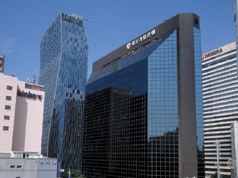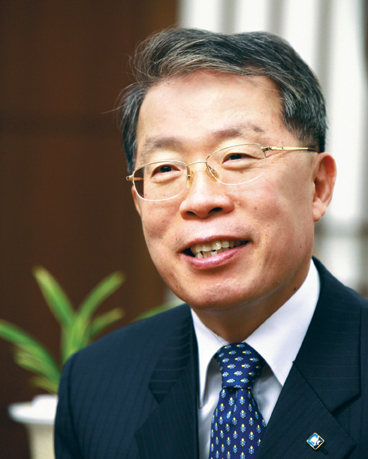IBK's Yun Optimistic on Banks
Banks will have excellent opportunities to expand business territories when financial crisis is over


President Yun Yong-ro of the Industrial Bank of Korea (IBK) said banks will be presented with good opportunities for growth when the current financial crisis is over. The bureaucrat-turned banker predicted that banks will have a period of resurgence when the current financial crisis gripping the world subsides during his speech at Yonsei University Management College's recent Maekyung-Yonsei University Special Lecture.
He said banks flush with cash from deposit accounts will join the rush for M&As around the world, adding that Lehman Brothers failed because of the dismal performance of its bond sales and the failure of its profit structure based on guarantees of financial bonds leading the company to a liquidity crisis. President Yun said the operation of banks kept up for about five years, following the takeover of struggling credit card companies, hurt by a piling up of non-performing assets.
Yun also expressed optimism for the real estate market when the bubble eventually bursts, which could lead to the rattling of some banks that loaned money to real estate developers or individuals based on apartments as collateral.
In Japan, which had 10 years of economic sluggishness, the financial institutions made loans for up to 100 percent of the market value of real estate, as did U.S. banks, while banks in Korea only extended loans for 50 percent of the market value of a mortgaged property. This will protect the banks when the real estate market experiences severe setbacks. Korea overcame its financial crisis of 1998, which was worse than the one the U.S. is currently faced with.
Yun said he is rather concerned about loans made against golf club memberships, as there are no guidelines for such loans. The prices of the membership could plunge from 30 to 40 percent instantly if banks start calling back the loans, as happened in Japan.
Regarding the U.S. economy, the IBK CEO said the U.S. government should prevent large firms from going bankrupt and expand government spending to revive the economy. The United States, faced with the worst financial crisis since the 1920s during the Great Depression, will manage to get it over. Yun said the U.S. has gone through seven large economic slumps since 1800 and this one, too, would not rattle the U.S. economy to its core.
Korea, too, would see its stock market humming by the end of 2009 with the revival of the financial market's vitality. He, however, called for a firm decision by the government and the central bank with regard to the turbulence in the foreign exchange market. The timing of the action is very critical, no matter how good it is. He called on the authorities to provide positive support to SMEs, especially those in the machinery industry.
Crises always occur during the winter and those who can stand the coldest winter are entitled to face the spring, he said, calling on every audience member to prepare for winter when the leaves turn brown and fall.
In the meantime, the IBK will be allowed to operate in financial sectors other than banking, as the restrictions on banking activities will be lifted by the Financial Services Commission (FSC). First of all, the limit on a bank's investment in its affiliates will be expanded to 30 percent of its capital from the current 15 percent, subject to approval from the FSC.
The move will allow IDB to enter other financial sectors including insurance, as the FSC will allow the IBK to set up subsidiaries within the boundary that the bank not reduce its loans to SMEs. The IBK will also be given the right to increase its capital to 4 trillion won. The IBK shares a special relationship with the government, as it was established under the Industrial Bank of Korea Act in 1961. The bank's primary objective is to "promote independent economic activities of small and medium-sized enterprises (SMEs) and to enhance their economic position in the national economy." The government retains full control over the bank including the appointment of management and the approval of budgetary and operational plans due to the public policy role of the bank.
The IBK plays a critical role in implementing SME promotion policies, which ensures the highest level of support from the government both implicitly and explicitly. nw
The head office building of the Industrial Bank of Korea in downtown Seoul.
President Yun Yong-ro of the Industrial Bank of Korea.
3Fl, 292-47, Shindang 6-dong, Chung-gu, Seoul, Korea 100-456
Tel : 82-2-2235-6114 / Fax : 82-2-2235-0799